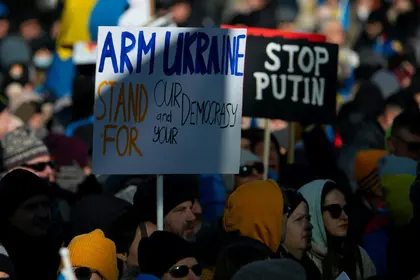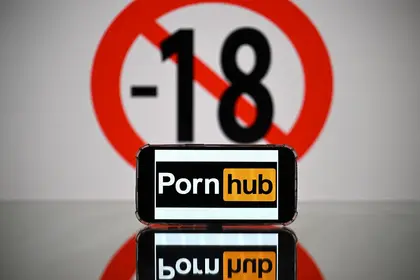“Without an independent Ukraine, Europe will never be secure.”
These words were uttered not by Ukrainian President Volodymyr Zelensky, by US President Joe Biden or by Ukraine’s foreign minister, Dmytro Kuleba. Nor were they spoken by NATO Secretary General Jens Stoltenberg or European Commission President Ursula von der Leyen. They were spoken 104 years ago by Poland’s leader, Marshal Jozef Pilsudski.
JOIN US ON TELEGRAM
Follow our coverage of the war on the @Kyivpost_official.
Although little known today in the English-speaking world, Pilsudski was regarded as a standout among European statesmen during the period between the two world wars. Commander-in-chief and head of state of the Polish state that emerged in November 1918, Pilsudski was a maverick of his day as the only European statesman after World War I to champion the independence of Ukraine. In the post-Word War I climate, when civil war engulfed Russia, the Western democracies belittled Pilsudski’s support for an independent Ukraine, characterizing it as incitement and provocation against Russia.
Born in 1867 in Imperial Russia, Pilsudski had served five years Siberian exile at the ages of 19-24 and was subsequently imprisoned twice by Russia for membership in the illegal Polish Socialist Party before going into exile in 1901. Nineteen years later, as leader of independent Poland, Pilsudski told a French journalist in February 1920: “Russia is fiercely imperialist. One could even say it is the fundamental feature of its political character.”

‘Putin Should Make a Deal’ – Trump Discusses NATO and Ending Ukraine War, Russia’s Losses
Today, two years after Russia’s full-scale invasion of Ukraine, three books on the war in Ukraine are required reading for anyone interested in the present-day Russo-Ukrainian War: one by a Russian dissident journalist, Mikhail Zygar, who argues that this war will bring shame on Russia for generations and will result in the final end of Russia as an empire; the second, by the Harvard historian, Serhii Plokhy, a definitive refutation of Vladmir Putin’s post-truth argument that Ukraine is historically and culturally part of Russia; and the third by the celebrated British journalist, Anna Reid, who makes a passionate case for continued Western support of Ukraine in the face of mounting Ukraine-fatigue by lawmakers in the US and Europe.
Taken together, the three books constitute a potent arm of support for Ukraine, praising its military prowess while arguing forcefully for continued Western unity against Putin’s Russia. Prof. Plokhy, one of the most influential Ukrainian historians of our times and author also of the celebrated “The Gates of Europe: A History of Ukraine,” remarks that the present-day Russo-Ukraine War is “the first ‘good war’ since the global conflict of 1939-1945, in which it was very clear from the start who was the aggressor and who was the victim, who was the villain and who was the hero, and whose side one wants to be on.”
Zygar certainly agrees. As he starkly writes: “Putin, has already in his lifetime, turned into an otherworldly, universal evil.”
Zygar, who today writes columns for Der Spiegal and the New York Times, dramatically left his mark on Russia on Feb. 24, 2022, the day the war started. He put out an editorial condemning the war in no uncertain words and then went into exile three days later.
“The war launched by Russia against Ukraine is shameful,” he wrote. “It is our shame, but, unfortunately, our children, as well as generations of still infant and unborn Russians, will also have to bear responsibility for it. We do not want our children to live in an aggressor country, to be ashamed that their army attacked a neighboring independent state. We call upon all citizens of Russia to say ‘no’ to this war.”
In the opening lines of his book, Zygar begins “War and Punishment” with the powerful voice of the Russian opposition. “This book is a confession. I am guilty for not reading the signs much earlier. I, too, am responsible for Russia’s war against Ukraine. As are my contemporaries and our forebears. Regrettably, Russian culture is also to blame for making all these horrors possible. Many Russian writers and historians are complicit in facilitating this war. It is their words and thoughts over the past 350 years that sowed the seeds of Russian fascism and allowed it to flourish. We failed to spot just how deadly the very idea of Russia as a ‘great empire’ was.”
Zygar follows with a prophecy for his country of birth: “Now the empire is forever consigned to the past. Some might argue it’s still too early to say. Oh no it isn’t. Further generations of Russians will remember with horror and shame the war that Putin unleashed.”
For the historian, Plokhy, the Russian war in Ukraine is likewise proof of the final end of the Russian imperial era.
“Russia and its elites,” Plokhy writes, “now have little choice but to reimagine their country’s identity by parting ways not only with the imperialism of the tsarist past but also with the anachronistic model of a Russian nation consisting of Russia, Ukraine, and Belarus.”
The war, Plohky concludes, “is terminating the era of Russian domination in a good part of eastern Europe and challenging Moscow’s claim to primacy in the rest of post-Soviet space.”
Anna Reid, who has been reporting on Ukraine since the early 1990s when she served as the Kyiv correspondent for The Economist, writes exquisitely about Ukraine’s past and present in “Borderland.” In her revised and enlarged 2023 edition, she captures the key moment of the first year of the Russo-Ukrainian War in vivid prose that will remain a standard account for years to come.
She reminds the reader not only of the turbulent recent history of Ukraine, from the 2004 Orange Revolution that reversed a blatantly stolen election and brought into power the liberal, pro-Western president, Viktor Yushchenko, to the massacres of Maidan Square in February 2014, when a half million Ukrainians marched in Kyiv to protest another stolen president election. Then, the police killed 94 civilian protesters in a mass demonstration, forcing into exile the corrupt pro-Putin president, Victor Yanukovich, who fled to Russia under Putin’s protection. She then chronicles Russia’s illegal annexation of Crimea which began one week later, and the war in the Donbas that followed.
Reid’s riveting eye-witness account of the Russo-Ukrainian War begins with her return to Ukraine in April 2022. At the time, she visited the newly liberated towns of the Kyiv region in the immediate aftermath of Russia’s withdrawal. News sources had just reported that 765 dead bodies in the Kyiv region alone had been discovered, mostly in execution-style killings.
Reid witnessed torn and charred buildings. She included this stunning encounter with a Ukrainian family: “One family had come back but only to board up windows and retrieve any salvageable belongings. A reason they could not stay, as they showed me, was that a small rocket had crashed through their living room wall and was sitting, unexploded, next to their rubble-covered sofa. They were the lucky ones.”
Reid concludes with a powerful warning to the West that Ukraine fatigue among American and European lawmakers threatens to undermine global security. Betraying Ukraine, she writes, “would be moral and strategic failure on a par with the crushed Hungarian Rising or Prague Spring – and with much less excuse. And even if we care only for ourselves, letting Putin come away victorious would make the whole world a more dangerous place. How long, if he is allowed to smash Ukraine, before China attacks Taiwan, or Serbia, Kosovo?”
She concludes with consternation about the Western timidity over Ukraine aid: “How long will Ukraine keep fighting? Behind the mantra that it is up to Ukraine to decide, the brute reality is that the West will decide, since it is supplying the weapons.”
There are, however, hopeful signs. After the disappointing Vilnius NATO Summit in July, when the body’s leadership failed to commit to a timetable for Ukraine membership, the European Commission President, Ursula von der Leyen, announced on Nov. 8 that the EU had initiated formal accession talks with Ukraine, Moldova and Bosnia-Herzegovina, signaling the EU’s serious considering of expansion to the east. “I think it is a massively important moment,” said Sam Greene from the Center for European Policy Analysis in Washington on Nov. 9.
With casualty figures already approaching those of World War I, we should consider the voices of NATO countries bordering Russia and Ukraine. Unwavering supporters of aid to Ukraine and champions of a full Ukrainian victory, these countries’ leaders have gone on record since the war began saying that for them, the question of Ukraine is an existential one: if Ukraine collapses, they are next in line for Russian aggression.
Echoing the views of Jozef Pilsudski 104 years ago, the present-day president of Poland, Andrzej Duda, said on Sept. 19 to CNN: “We need to help Ukrainians defend themselves. This is our obligation vis-à-vis the free world. As I have said, Ukraine must regain control over its internationally recognized borders. We must make sure that Russia is not allowed legally to reshape the borders of Europe by force, to occupy the lands of an independent and sovereign European country. Only this outcome is the guarantee of peace in the future, also for the United States of America.”
In a debate in the US Senate over the floundering Ukraine, Israel and Taiwan aid bill on Feb. 12, 2024, Sen. Maggie Hassan, chair of the Homeland Security Subcommittee on Emerging Threats & Spending Oversight, argued forcefully, “If we are interested in standing up to authoritarians, and standing up for freedom, as my father did in the Battle of the Bulge during World War II, then we need to make sure that we make clear to Iran, to China, to North Korea, and to Vladimir Putin, that the United States of America stands for freedom, and if my colleagues are serious about that then they will be supporting this bill.”
In a historic vote one day later, the United States Senate passed a $95 billion aid bill for Ukraine, Israel, and Taiwan with a solid majority of 67 to 32. But with the dysfunctional House under leader Mike Johnson, the bill was declared dead on arrival.
President Biden delivered a powerful rebuke to House Republicans determined to squash the bill under the direction of former president Donald Trump. “Supporting this bill,” Biden said on February 14, 2024, “is standing up to Putin. Opposing it is playing into Putin’s hands. And so I say to House Republicans: you have to decide – are you going to stand up for freedom or are you going to side with terror and tyranny. Are you going to stand with Ukraine or are you going to side with Putin. Are you going to stand with America or Trump. Republicans and Democrats in the Senate came together to send a message of unity to the world. It is time for the Republicans in the House to do the same thing – to pass this bill immediately. To stand for democracy and stand up to a leader hell bent on weakening American security. And I mean it sincerely – history is watching.”
Zygar repeatedly warns the West about the need for a united front against Putin’s Russia. And perhaps the strongest moral voice in the three books under review comes from Zygar, who calls for a new, decolonizing interpretation of Russian history.
“We must strip the state of the right to impose its own view of the past on us,” Zygar writes. “We have to roll up our sleeves and completely reinterpret our history, or rather the history of the peoples who fell victim to the empire. We have to look at the stories of those who have lived in Russia for centuries, who have been raped and killed for centuries, the pain blunted by imperial morphine. Administered by rulers who never hastened to up the dose.”
You can also highlight the text and press Ctrl + Enter










